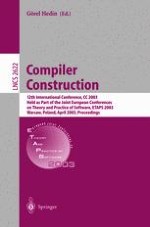2003 | Buch
Compiler Construction
12th International Conference, CC 2003 Held as Part of the Joint European Conferences on Theory and Practice of Software, ETAPS 2003 Warsaw, Poland, April 7–11, 2003 Proceedings
herausgegeben von: Görel Hedin
Verlag: Springer Berlin Heidelberg
Buchreihe : Lecture Notes in Computer Science
Enthalten in: Professional Book Archive
